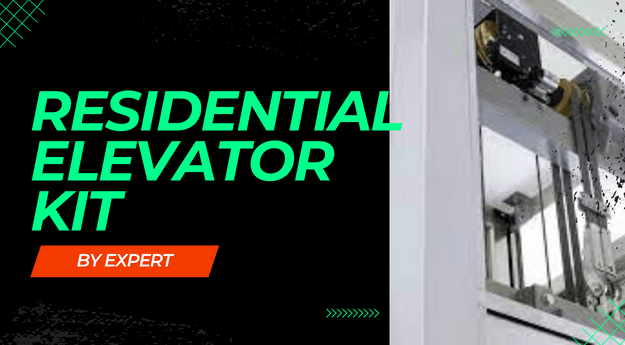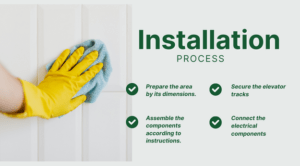Residential elevator kits offer easy installation and great warranty options for homeowners in Austin, Texas. When it comes to adding convenience and accessibility to your residence, a residential elevator kit can be a practical solution.
Elevators can provide a safe and efficient way for individuals with mobility issues to move between floors, and with various affordable options available on the market, homeowners can find a kit that suits their specific needs and budget. Considering factors like space availability, installation requirements, and cost, choosing the right residential elevator kit can enhance the overall functionality and value of your home.
Whether it’s for aging in place or improving convenience, investing in a residential elevator kit can be a worthwhile addition to your property.
Topics Covered
ToggleChoosing The Right Residential Elevator Kit

When considering a residential elevator kit, it’s crucial to choose the one that fits your needs perfectly.
Factors To Consider Before Purchasing
- Space: Ensure the elevator kit fits the available space in your home.
- Budget: Determine your budget to narrow down options.
- Safety: Check for safety features and certifications.
- Installation: Consider ease of installation and maintenance.
- Aesthetics: Choose a design that complements your home’s interior.
Comparing Different Elevator Kits
| Elevator Kit | Price |
|---|---|
| Universal Lifts Home Elevator Package | $1,000.00 |
| AmeriGlide Carolina Elevator | $17,999.00 |
| Mini residential lift elevator | $859.60 |
Don’t just focus on the price; consider features, warranty, and reviews before making a final decision.
When comparing kits, look for one that offers a balance between affordability and quality to ensure a long-term investment.
Installation Process Of Residential Elevator Kit

The installation process of a residential elevator kit involves assembling the components, securing the railings, and ensuring the electrical connections are in place. It requires precision and expertise to ensure a seamless and safe installation for convenient access within the home.
Step-by-step Guide To Installing
Installing a residential elevator kit involves several steps to ensure a smooth process.
- Prepare the designated elevator area by ensuring it meets the necessary dimensions.
- Assemble the elevator components according to the manufacturer’s instructions.
- Secure the elevator tracks and ensure they are level for safe operation.
- Connect the electrical components and perform a thorough inspection before testing the elevator.
- Test the elevator thoroughly to ensure it operates smoothly and safely.
Common Challenges And Solutions
During the installation process of a residential elevator kit, various challenges may arise:
- Space constraints may require adjustments in the layout.
- Electrical compatibility issues can be resolved with professional assistance.
- Ensuring proper weight distribution may require additional support structures.
- Alignment issues can be rectified by recalibrating the elevator components.
Understanding The Warranty Of Residential Elevator Kits

Residential Elevator kits come with warranties that ensure peace of mind for homeowners. Understanding the warranty terms is crucial for long-term maintenance and support of your elevator system. Proper comprehension can help you make the most of your residential elevator investment.
Key Points To Look For In The Warranty
When considering a residential elevator kit, it’s crucial to understand the warranty included. Key points to pay attention to in the warranty are: – Duration: Check for the length of the warranty. Longer warranties provide more extensive coverage and assurance. – Coverage: Understand what is covered under the warranty. Components, labor, and service should all be explicitly stated. – Exclusions: Take note of any exclusions or limitations within the warranty to manage expectations properly.
Comparing Warranties From Different Manufacturers
Comparing warranties from different manufacturers is essential to ensure you get the best coverage for your residential elevator kit. Look for variations in coverage duration, included components, and service terms from various providers to make an informed decision. Comparing warranties can give you insight into the value and quality of the residential elevator kits offered by different manufacturers.
Cost Considerations For Residential Elevator Kits
Installing a residential elevator can greatly enhance the accessibility and convenience of your home. However, before embarking on this project, it is essential to consider the costs involved. Understanding the factors that impact the total cost of a residential elevator kit can help you make an informed decision. In this article, we will explore the average cost of elevator kits and the factors that can affect the overall expense.
Average Cost Of Elevator Kits
The cost of residential elevator kits can vary significantly depending on various factors such as the brand, size, features, and customization options. On average, elevator kits can range from as low as $1,000 to as high as $59,000. The price difference is influenced by the quality of materials used, the weight capacity, and the level of sophistication in terms of design and technology.
Factors Impacting The Total Cost
Several factors can impact the total cost of installing a residential elevator kit:
- Size and capacity: Larger elevators with higher weight capacities tend to be more expensive due to the need for stronger components and more substantial construction.
- Customization options: Additional features such as cabin finishes, lighting, control panels, and safety systems can increase the cost of the elevator kit.
- Installation requirements: The complexity of the installation process, including any structural modifications needed, can affect the overall cost.
- Location: The region and accessibility of your home can impact transportation costs, especially if you live in a remote area.
- Maintenance and service agreements: It is essential to consider the long-term costs associated with maintenance and service agreements to keep your elevator in optimal working condition.
Safety And Regulations For Home Elevators

For residential elevator kits, safety regulations are crucial. Compliance ensures proper installation and operation, prioritizing user safety at home. Manufacturers provide guidelines to guarantee a secure and reliable home elevator experience.
Ensuring Compliance With Safety Standards
When it comes to installing a residential elevator kit in your home, safety should be a top priority. It is essential to ensure that the elevator meets all the necessary safety standards and regulations to provide a secure and worry-free experience for you and your family.
Common Safety Features And Maintenance
Home elevators come equipped with several common safety features that are designed to prevent accidents and ensure smooth operation. These features include:
- Emergency stop button: This allows passengers to instantly stop the elevator in case of an emergency or malfunction.
- Safety sensors: These sensors are installed around the elevator entrance and detect any obstructions, preventing the doors from closing if something or someone is blocking the way.
- Handrails and grab bars: These provide extra support and stability to passengers as they enter, exit, or ride the elevator, especially for those with mobility concerns.
- Non-slip flooring: The elevator cabin should have non-slip flooring to prevent slips and falls, ensuring safety even when the floor is wet.
- Emergency backup power: Most residential elevators are equipped with a backup power supply, ensuring that the elevator can still be operated during a power outage.
Maintenance is crucial for keeping your home elevator running smoothly and ensuring its long-term safety and efficiency. Regular inspections and upkeep by professionals help identify and address any potential issues before they become major problems.
In addition to regular maintenance, it is recommended to conduct monthly checks on safety features, such as testing emergency stop buttons and sensors, to ensure they are functioning correctly. Proper maintenance and inspections not only protect your investment but also give you peace of mind knowing that your elevator is safe and reliable.
Frequently Asked Questions For Residential Elevator Kit
What Is The Cheapest Elevator To Install?
The cheapest elevator to install is a residential platform lift, with prices starting as low as $853. 74.
How Much Is The Smallest Residential Elevator?
The smallest residential elevator can cost as low as $853. 74. Affordable options range from $853. 74 to $22,995. 00. Some reputable brands offering inexpensive residential elevators include AmeriGlide and AliExpress. Explore options online or contact experts for more information.
Please note that the prices mentioned are based on the available information at the time of writing and may vary.
Are Shaftless Elevators Safe?
Yes, shaftless elevators are safe. They are as secure as traditional elevators and can be used in high-traffic areas.
What Is The Cost Of 2 Person Lift?
The cost of a 2-person lift can vary widely, from $800 to over $50,000, depending on the type and brand.
Conclusion
Residential elevator kits offer convenience and accessibility for individuals with mobility issues. With various options and price ranges available, homeowners can find a suitable solution to meet their specific needs. From space-saving shaftless elevators to traditional models, there are options to fit any home.
Consider consulting a specialist for installation to ensure safety and proper function.
